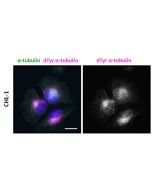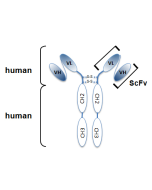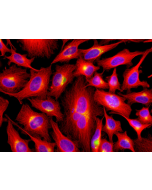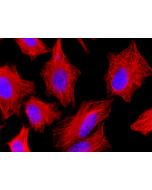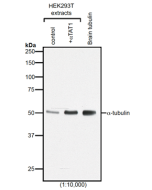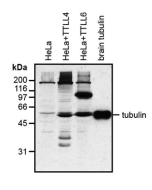Cookie Policy: This site uses cookies to improve your experience. You can find out more about our use of cookies in our Privacy Policy. By continuing to browse this site you agree to our use of cookies.
AdipoGen Life Sciences
anti-Delta2-Tubulin, pAb (IN120)
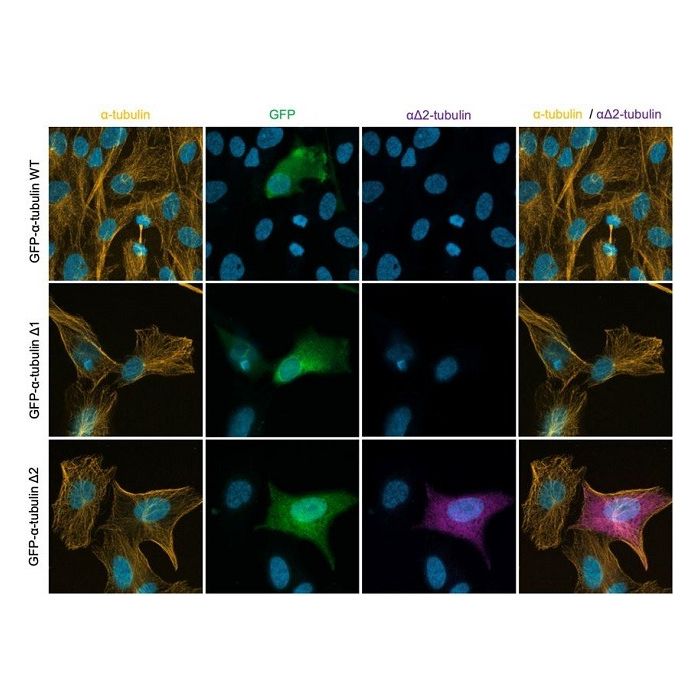
Method: RPE1 cells either transfected with GFP-alpha-Tubulin WT (lane 1) (C-terminal sequence CEGEEEGEEY), or transfected with GFP-alpha-Tubulin Del1 (lane 2) (C-terminal sequence CEGEEEGEE), or transfected with GFP-alpha-Tubulin Del2 (lane 3) (C-terminal sequence CEGEEEGE), are subjected to immunostaining. RPE1 cells are fixed in MeOH at -20°C for 5 min, washed in PBS three times then subjected to immunostaining in phosphate-buffered saline (PBS) supplemented with 3% BSA and 0.1% Triton X-100 using anti-alpha-Tubulin (Prod. No. AG-27B-0005) (at 1µg/ml), anti-Delta2-Tubulin, pAb (IN120) (Prod. No. AG-25B-0044) (at 1µg/ml) or GFP fluorescence. The antibody anti-Delta2-Tubulin, pAb (IN120) specifically detects the deletion 2 (C-terminal sequence -CEGEEEGE) of alpha-tubulin. Picture courtesy of Dr. Ghislain Gillard, IGH CNRS, Montpellier.
| Product Details | |
|---|---|
| Synonyms | Δ2-Tubulin |
| Product Type | Polyclonal Antibody |
| Properties | |
| Source/Host | Rabbit |
| Immunogen/Antigen | KLH coupled CEGEEEGE-COOH peptide. |
| Application |
Western Blot: (1:10'000) |
| Crossreactivity |
All Human Mouse Rat |
| Specificity |
This antibody recognises the posttranslationally modified form of alpha-tubulin known as ∆2-tubulin. This modification is generated after enzymatic removal of two C-terminal amino acids, Y and E in a process of detyrosination (removal of Y by detyrosinating enzymes from the VASH and the MATCAP/TMCP families), followed by the removal of the penultimate E residue by enzymes from the cytosolic carboxy peptidase (CCP) family. |
| Purity | ≥95% (SDS-PAGE) |
| Purity Detail | Epitope-affinity purified. |
| Concentration | 0.5mg/ml |
| Formulation | Liquid. In PBS containing 0.02% Proclin 300. |
| Isotype Negative Control | |
| Shipping and Handling | |
| Shipping | BLUE ICE |
| Short Term Storage | +4°C |
| Long Term Storage | -20°C |
| Handling Advice |
After opening, prepare aliquots and store at -20°C. Avoid freeze/thaw cycles. |
| Use/Stability | Stable for at least 1 year after receipt when stored at -20°C. |
| Documents | |
| MSDS |
 Download PDF Download PDF |
| Product Specification Sheet | |
| Datasheet |
 Download PDF Download PDF |
Microtubules are key elements of the eukaryotic cytoskeleton that dynamically assemble from heterodimers of α- and β-tubulin. Two different mechanisms can generate microtubule diversity: the expression of different α- and β-tubulin genes, referred to as tubulin isotypes, and the generation of posttranslational modifications (PTMs) on α- and β-tubulin. Tubulin PTMs include the well-known acetylation or phosphorylation, and others that have so far mostly been found on tubulin, detyrosination/tyrosination, polyglutamylation and polyglycylation. These PTMs might have evolved to specifically regulate tubulin and microtubule functions. Delta 2 tubulin (Δ2-tubulin) is a specific posttranslationally modified form of α-tubulin. It is characterized by the removal of the C-terminal tyrosine residue (detyrosination) and an additional cleavage of the next-to-last glutamic acid residue, resulting in a truncated C-terminal tail. This modification makes Δ2-tubulin distinct from other tubulin isoforms and modifications.
Δ2-tubulin is primarily found in stable microtubules, such as those in neurons, centrioles, and cilia. It is abundant in tissues with long-lived, highly specialized structures. The removal of the C-terminal residues is associated with increased microtubule stability, making Δ2-tubulin a marker for stable, long-lived microtubule networks and plays a critical role in cellular processes requiring stable microtubules, such as intracellular trafficking, cell shape maintenance, and the proper functioning of axons and dendrites in neurons. Δ2-tubulin is also enriched in the microtubules of axonemes (the structural core of cilia and flagella), where it contributes to the structural integrity and function of these organelles.
Δ2-tubulin supports the stability of microtubules in neurons, aiding in the maintenance of axonal transport and synaptic connections. It is involved in centrosome organization and mitotic spindle stability, contributing to accurate cell division and it plays a role in maintaining the structural and functional integrity of motile cilia and flagella. Abnormalities in Δ2-tubulin levels or distribution have been associated with various conditions, including neurodegenerative diseases, ciliary dysfunction disorders or cancer.
- A family of protein-deglutamylating enzymes associated with neurodegeneration: K. Rogowski, et al.; Cell 143, 564 (2010)
- A family of carboxypeptidases catalyzing α- and β-tubulin tail processing and deglutamylation: S. Nicot, et al.; Sci. Adv. 9, eadi7838 (2023)






